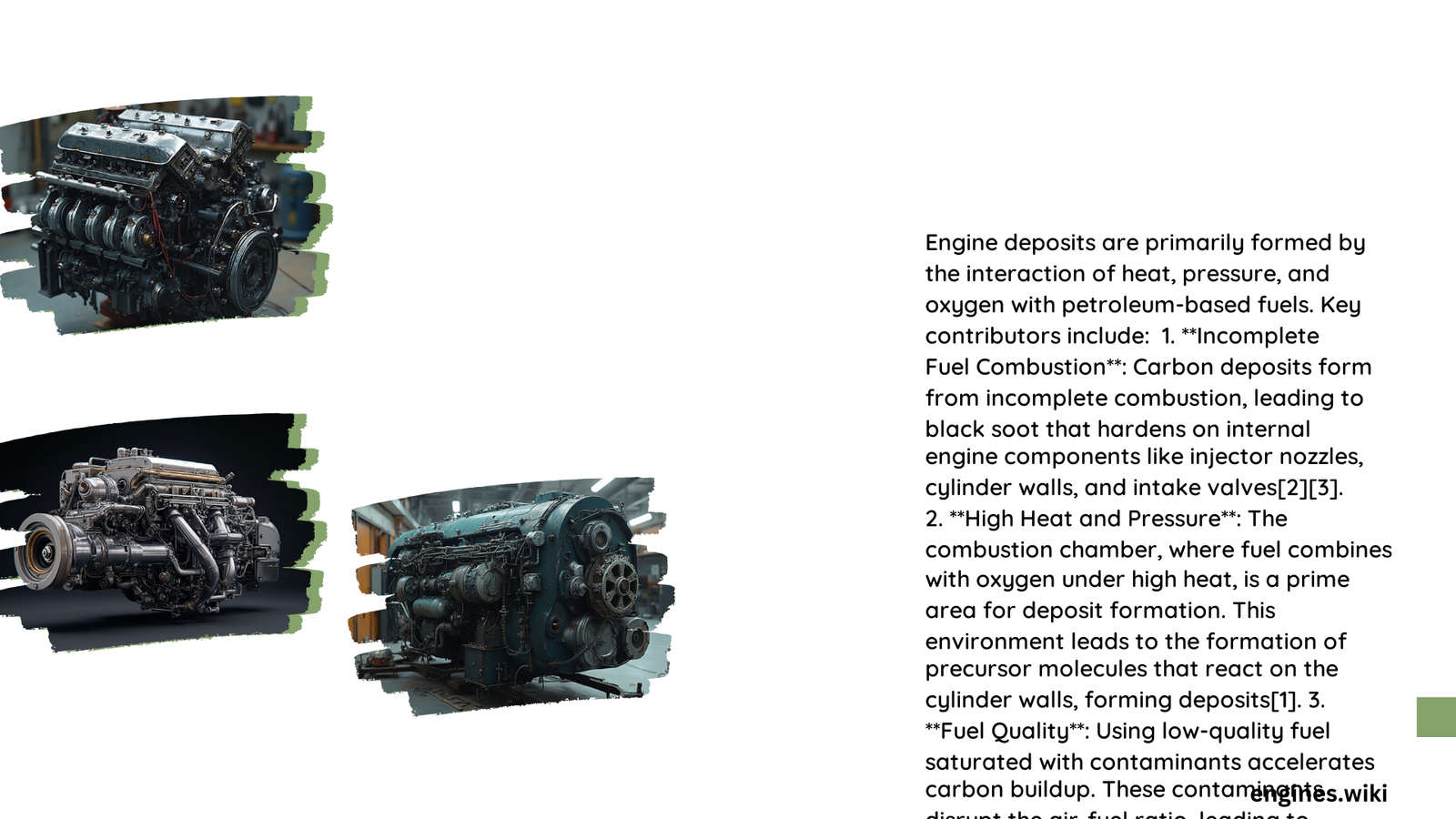Engine deposits are a common issue in vehicles, resulting from various factors including fuel quality, combustion efficiency, oil degradation, and engine temperature. These deposits can accumulate on critical engine components, leading to reduced performance, increased fuel consumption, and potential engine damage. Understanding the key contributors to engine deposits is crucial for maintaining optimal engine health and longevity.
What Role Does Fuel Quality Play in Engine Deposit Formation?
Fuel quality is a significant factor in the formation of engine deposits. The chemical composition and octane rating of fuel can greatly influence deposit accumulation:
- Low Octane Fuel: Gasoline with lower octane ratings may not burn as efficiently, leading to incomplete combustion and increased deposit formation on piston crowns and intake valves.
- Contaminants: Fuels with higher levels of impurities, such as sulfur, can contribute to deposit formation through polymerization of fuel molecules under high temperatures and pressures.
- Additives: The presence or absence of detergent additives in fuel can affect deposit formation. High-quality fuels often contain additives that help prevent and clean existing deposits.
Fuel Quality Impact Table
| Fuel Aspect | Impact on Deposit Formation |
|---|---|
| Octane Rating | Lower ratings increase deposits |
| Contaminant Levels | Higher levels promote deposits |
| Detergent Additives | Absence increases deposit risk |
How Does Combustion Efficiency Affect Engine Deposits?

Combustion efficiency plays a crucial role in the formation of engine deposits. Several factors contribute to this:
- Temperature Ranges:
- High temperatures during combustion (typically above 200°C or 392°F) can lead to deposit formation.
-
Unburned fuel vapor and evaporated engine oil interact with these high temperatures to form carbon deposits.
-
Air-Fuel Ratios:
- Poor air-fuel mixtures, either too rich or too lean, can result in incomplete combustion.
-
Rich mixtures (more fuel than air) can lead to unburned fuel vapor contributing to deposit buildup on intake valves and combustion chambers.
-
Ignition Timing:
- Incorrect ignition timing can affect combustion efficiency.
- Early or late fuel ignition can create hot spots and incomplete combustion, causing carbon deposits on piston crowns and other engine components.
What Is the Impact of Oil Degradation on Engine Deposits?
Oil degradation is a significant contributor to engine deposit formation:
- Oil Types and Viscosity Grades:
- Lower quality oils or those with inadequate additive packages can degrade more quickly.
- Rapid degradation leads to increased oil oxidation and carbon deposit formation.
-
High-quality full synthetic oils with effective additive packages can help reduce oil oxidation and limit deposit formation.
-
Additive Packages:
- The presence and quality of additives in the oil are crucial for preventing deposit formation.
- Additives that reduce oil oxidation are particularly important in minimizing deposits formed from engine oil.
Oil Degradation Factors List
- Oil quality
- Viscosity grade
- Additive package effectiveness
- Oxidation resistance
- Oil change intervals
How Does Engine Temperature Contribute to Deposit Formation?
Engine temperature is a critical factor in the formation of engine deposits:
- Critical Temperature Thresholds:
- Deposits are more likely to form when the engine operates at high temperatures for extended periods.
-
Temperatures above the normal operating range, often exceeding 200°C (392°F), are particularly problematic.
-
Cooling System Efficiency:
- The efficiency of the cooling system plays a significant role in preventing excessive heat buildup.
-
Poor cooling system performance can lead to higher engine temperatures, increasing deposit formation.
-
Thermal Management:
- Modern engine technologies like variable valve timing, turbocharging, and positive crankcase ventilation systems can increase the likelihood of carbon deposits due to increased heat and pressure.
What Are the Long-Term Effects of Engine Deposits?
Engine deposits can have several long-term effects on vehicle performance and longevity:
- Reduced Fuel Efficiency:
- Deposits can disrupt the optimal air-fuel mixture, leading to increased fuel consumption.
-
Carbon buildup on fuel injectors can alter spray patterns, affecting combustion efficiency.
-
Decreased Engine Performance:
- Deposits on intake valves can restrict airflow, reducing engine power and responsiveness.
-
Accumulation on piston crowns can increase compression ratios, potentially leading to pre-ignition or knocking.
-
Increased Emissions:
- Incomplete combustion due to deposits can result in higher levels of harmful emissions.
-
This can lead to failed emissions tests and environmental concerns.
-
Accelerated Wear:
- Deposits can act as abrasives, increasing wear on engine components.
- This can lead to reduced engine life and potentially costly repairs.
Long-Term Effects Table
| Effect | Description |
|---|---|
| Fuel Efficiency | Decreased due to disrupted air-fuel mixture |
| Performance | Reduced power and responsiveness |
| Emissions | Increased harmful exhaust emissions |
| Engine Wear | Accelerated wear on components |
How Can Engine Deposits Be Prevented or Reduced?
Preventing and reducing engine deposits requires a multi-faceted approach:
- Use High-Quality Fuel:
- Choose fuels with appropriate octane ratings for your vehicle.
-
Opt for fuels with effective detergent additives.
-
Regular Oil Changes:
- Follow manufacturer-recommended oil change intervals.
-
Use high-quality synthetic oils with robust additive packages.
-
Maintain Proper Engine Temperature:
- Ensure the cooling system is functioning correctly.
-
Address any overheating issues promptly.
-
Drive Habits:
- Avoid frequent short trips that don’t allow the engine to reach optimal operating temperature.
-
Periodically drive at highway speeds to help clean out deposits.
-
Fuel System Cleaners:
-
Use quality fuel system cleaners periodically to help remove existing deposits.
-
Regular Maintenance:
- Follow the vehicle’s maintenance schedule for tune-ups and inspections.
- Address any performance issues promptly to prevent deposit accumulation.
By understanding what contributes to engine deposits and taking proactive measures, vehicle owners can significantly reduce the risk of deposit-related issues and maintain optimal engine performance and longevity.
